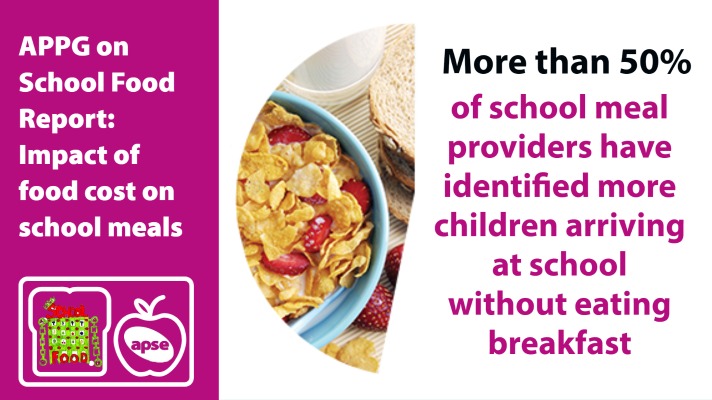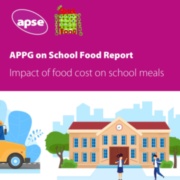Over half of school meal providers have identified more children arriving at school without eating breakfast
The survey, conducted by the Association for Public Service Excellence on behalf of the All-Party Parliamentary Group (APPG) for School Food, found that, of those surveyed, 49.72% report that they have seen a decrease in the number of paid meals being served and 36.16% reported a decrease in the quality of packed lunches.
The survey also found that, in just three months, close to 50% of school meal providers surveyed had experienced an increase in food costs of at least 20%.
Other key findings
- Just under 60% of respondents, reported that dinner money debt had either increased or significantly increased
- An overwhelming majority of respondents (97.25%) stated they anticipated food costs will continue to rise.
- 57.14% of those surveyed report that utility costs have increased, with one respondent noting a five-fold increase in utility costs.
- A comfortable majority of respondents (70.33%) believed that extending UIFSM to all primary aged children would assist in alleviating the impact of rising food costs.

Speaking about the findings, Paul O’Brien, APSE Chief Executive, said:
“The comments paint a picture of caterers and schools putting in significant time and effort to source produce, redesign menus and look at different ways to mitigate and reduce the impact of rising food costs on school food quality and the cost to parents.
“Interventions that could be taken to mitigate the impact of rising food costs have been outlined in the report with 70.33% of respondents to the survey believing that extending UIFSMs to all primary school aged children would help alleviate the impact.
“The delivery of school meals in England is complex and has a range of interdependencies, including funding, uptakes, eligibility, quality, and competitive tendering. Short-term interventions such as increasing the funding for a free school meal would be effective and a welcome intervention. The pandemic and the cost-of-living crisis has highlighted the importance of a hot, nutritious school meal to all children and especially those from low-income families or of those on squeezed benefits. Therefore, a long-term strategy needs to be put in place to ensure that there is a sustainable school meals service for future generations to come.”
A full analysis of the “APPG on School Food Survey: Impact of food cost on school meals” can be viewed online here.
NOTES TO EDITOR
- APSE conducted an online survey on behalf of the All-Party Parliamentary Group (APPG) on School Food in July and August 2022.
- There were over 180 respondents to the survey. The respondents represented a cross section of views from across the school meal landscape.
- The All-Party Parliamentary Group (APPG) on School Food exists to provide a cross-party parliamentary platform for the discussion of school food with external organisations; to keep school food and child hunger on the political agenda following the spotlight given during the Covid-19 pandemic and to campaign to ensure that children receive high quality meals in and outside of school.
- APSE act as the secretariat to the All Party Parliamentary Group (APPG) for School Food.
- The Association for Public Service Excellence (APSE) is a not-for-profit local government body working with over 300 councils throughout the UK. Promoting excellence in public services, APSE is the foremost specialist in local authority frontline services and operates one of the UK’s largest research programmes in local government policy and frontline service delivery matters.
- For further press enquiries, or to arrange an interview, please contact APSE Deputy Chief Executive Mo Baines on [email protected] or APSE Communications Officer Matt Ellis on [email protected]


.png)



.png)